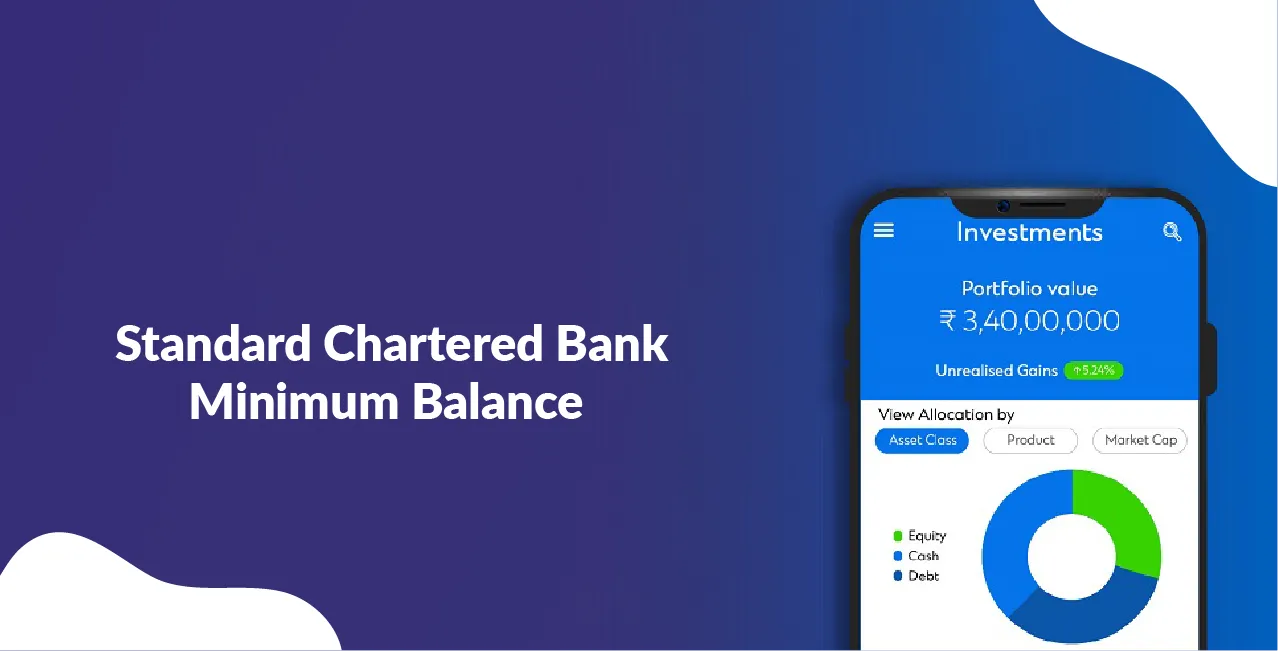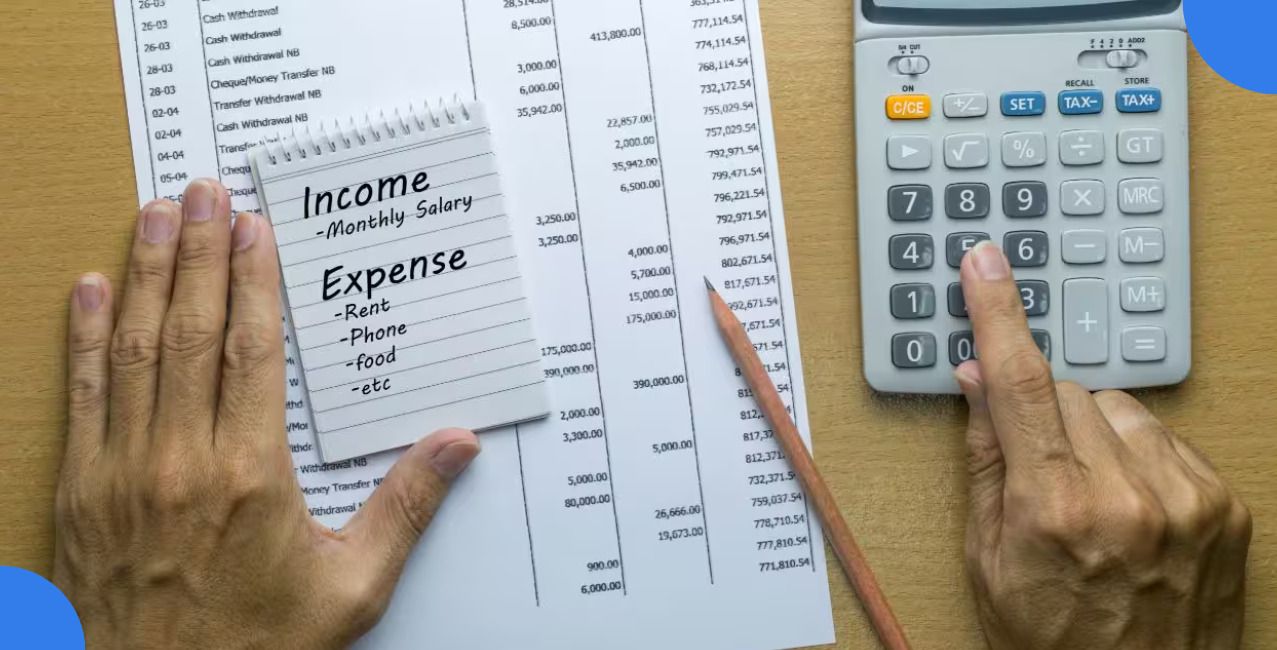Standard Chartered Bank Minimum Balance – Rules, Limits & Charges

Check Your Loan Eligibility Now
By continuing, you agree to LoansJagat's Credit Report Terms of Use, Terms and Conditions, Privacy Policy, and authorize contact via Call, SMS, Email, or WhatsApp
Himesh deposited money in the Supervalue savings account with Standard Chartered Bank in the amount of ₹1,50,000. The bank informed him that he was to maintain a minimum of ₹50,000 in his account at all times.
(The bank can impose a penalty when his balance dips below ₹50,000.)
Here’s a simple table to explain:
Key Points:
- Himesh must keep ₹50,000 or more in his account.
- If his balance drops below ₹50,000 (e.g., ₹45,000), he may have to pay a fee.
- The minimum balance rule helps the bank manage accounts better.
Himesh checks his balance regularly to avoid penalties.
What is Minimum Balance?
This is the amount of money you have to maintain at least at all times in the bank account. When you get a lower amount than this, then the bank can impose a penalty charge on you.
Example: Himesh’s Bank Account
Himesh opened a Savings Account with Standard Chartered Bank with ₹1,50,000. The bank told him he must always keep at least ₹50,000 in his account. This ₹50,000 is the minimum balance.
- If Himesh’s balance stays above ₹50,000, no problem.
- If his balance falls below ₹50,000 (like ₹45,000), the bank may deduct a penalty fee.
Here’s a simple table to explain:
Key Points:
- Banks set a minimum balance rule to keep accounts active.
- If you don’t maintain it, you may have to pay extra charges.
- Different banks (and account types) have different minimum balance rules.
Himesh checks his account often to make sure he never goes below ₹50,000 and avoids penalties.
Standard Chartered Bank Minimum Balance Requirement by Account Type
Banks ask customers to maintain a minimum money with them. This is referred to as the minimum balance. When the balance goes below this limit, the bank can add the charge.
Example: Himesh’s Account Choice
Himesh wants to open an account with Standard Chartered Bank. The bank offers different accounts with different minimum balance rules:
- Supervalue Savings Account: Must keep at least ₹50,000
- Prime Savings Account: Must keep at least ₹2,00,000
- Basic Banking Savings Account: Zero balance (no minimum needed)
Himesh chooses the Supervalue Savings Account because he can maintain ₹50,000. If his balance drops below this, the bank may charge a penalty.
Read More - Standard Chartered Bank Customer Care Number: Complete Guide
Here’s a simple table for clarity:
Key Points:
- Higher-tier accounts (like Prime Savings) require a bigger minimum balance.
- A Basic Banking Account is best if you can’t maintain a high balance.
- Always check the minimum balance rule before opening an account to avoid extra charges.
Himesh monitors his balance so that at no point does he run low of less than 50,000, and to keep out of any penalty.
Standard Chartered Bank Non-Maintenance Charges
In case you fail to maintain the minimum balance of the account, the bank levies a penalty. This is termed as non-maintenance charges.
Example: Himesh’s Penalty
Himesh has a Supervalue Savings Account with a minimum balance requirement of ₹50,000. But one month, his balance drops to ₹40,000, which is ₹10,000 short of the required amount.
- Shortfall Amount: ₹10,000
- Penalty Calculation: 5% of the shortfall (5% of ₹10,000 = ₹500)
- Maximum Penalty: ₹600 (even if 5% exceeds this amount)
Since ₹500 is less than ₹600, Himesh is charged ₹500 for that month.
Here’s a simple table to explain:
Key Points:
- The penalty is 5% of the amount you fall short by.
- The maximum charge is ₹600 per month, even if 5% higher.
- Always check your balance to avoid these extra fees.
Himesh has learnt to ensure that his balance is never less than ₹50,000 to avoid accruing penalties.
How to Check Your Monthly Average Balance in Standard Chartered Bank
Himesh also requires ensuring that he does not go below his minimum balance of ₹50,000 in his Standard Chartered account. This is how he balances his monthly average balance to avoid being charged:
- Internet Banking:
- Log in to Standard Chartered online banking
- Go to "Accounts" and select "Account Summary"
- Check the "Average Monthly Balance" section
- Mobile Banking App:
- Open the SC Mobile App
- Tap on your account details
- Look for "Average Balance" or "Monthly Balance"
- ATM Receipt:
- Withdraw cash or check balance at an ATM
- The printed receipt may show your average balance
- Bank Statement:
- Download your monthly e-statement
- Find the "Average Balance" mentioned in the summary
- Customer Care:
- Call the Standard Chartered helpline
- Ask the representative for your average balance
Key Points for Himesh:
- Checking regularly helps avoid penalties
- The average balance is calculated based on daily balances for the month
- If Himesh's balance drops too low, he can transfer money to meet requirements
Himesh also carries out a check every 15 days using the mobile app to ensure he is safe. The practice also saves him an additional fee.
Also Read - Standard Chartered Zero Balance Account – Complete Guide to Apply & Use
How to Avoid Minimum Balance Penalties?
Himesh is interested in continuing to use his Standard Chartered account and avoiding additional charges. This is how he manages to escape the penalty of low balances:
- Know Your Requirement
Himesh remembers that his Supervalue account needs ₹50,000 minimum balance at all times.
- Set Balance Alerts
He turned on SMS and email alerts from the bank to warn him when his balance gets low.
- Check Balance Weekly
Every Sunday, Himesh logs into mobile banking to check his account balance.
- Keep Extra Funds
He always maintains ₹55,000 instead of just ₹50,000 for safety.
- Use Auto-Top Up
Himesh set up automatic transfers from his salary account if the balance drops below ₹52,000.
- Choose the Right Account
Next time, he might switch to a Basic Banking Account with a zero balance requirement if he can't maintain funds.
Himesh has not paid any penalty in the last six months by taking this simple step. The main way is to be attentive and plan.
Conclusion
Himesh discovered that it is easy to avoid a minimum balance fee in his Standard Chartered account by planning well. Being aware of his needs of ₹50,000, inputting the balance alert, and weekly access to the account, he is on track with his financial management.
Saving a small amount of money in reserve and thinking about automatic deductions made the difference, as he managed not to face shortages.
In case this balance becomes cumbersome, he is aware that he can change into a no-balance Basic Banking Account. These are minor and intelligent things that have helped Himesh avoid extra charges, and they have taught us that banking may not be such an uncomfortable process with proper care and a proper attitude.
FAQs: Standard Chartered Bank Minimum Balance
1. What is the minimum balance in the Standard Chartered Bank?
The minimum balance is the lowest amount you must keep in your account. For example, Himesh’s Supervalue Savings Account requires ₹50,000, while a Basic Banking Account has no minimum balance.
2. What happens if I don’t maintain the minimum balance?
If your balance falls below the required amount, the bank charges a penalty—usually 5% of the shortfall, up to ₹600 per month.
3. How is the minimum balance calculated?
It is based on your average daily balance for the month. If your balance changes often, the bank averages it out.
4. Can I avoid minimum balance charges?
Yes, by keeping extra money in your account, setting balance alerts, or switching to a zero-balance account if eligible.
5. Which Standard Chartered accounts have no minimum balance?
The Basic Banking Savings Account has no minimum balance requirement, making it good for those who can’t maintain high balances.
6. How can I check my minimum balance?
Use internet banking, the mobile app, ATM receipts, or call customer care to see your current and average balance.
7. Is the penalty charged every month?
Yes, if your balance stays below the limit, the penalty applies each month until you meet the requirement.
8. Can I change my account type to avoid penalties?
Yes, you can switch to an account with a lower or zero minimum balance, but check with the bank for eligibility.
9. What if I can’t pay the penalty fee?
The bank deducts it automatically from your account. If your balance is too low, it may go negative, leading to more charges.
10. Does a joint account have the same minimum balance rule?
Yes, joint accounts follow the same minimum balance requirement as individual accounts of the same type.
Other Related Pages | |||
About the author

LoansJagat Team
Contributor‘Simplify Finance for Everyone.’ This is the common goal of our team, as we try to explain any topic with relatable examples. From personal to business finance, managing EMIs to becoming debt-free, we do extensive research on each and every parameter, so you don’t have to. Scroll up and have a look at what 15+ years of experience in the BFSI sector looks like.
Subscribe Now
Related Blog Post

Salaried vs. Self-Employed: Who Gets a Personal Loan Faster in 2025?

Too Many EMIs? What to Do When Monthly Payments Become Unmanageable

Post Office Customer Care Number: Helpline & Support
Recent Blogs
All Topics
Contents
Quick Apply Loan
Consolidate your debts into one easy EMI.
Takes less than 2 minutes. No paperwork.
10 Lakhs+
Trusted Customers
2000 Cr+
Loans Disbursed
4.7/5
Google Reviews
20+
Banks & NBFCs Offers
Other services mentioned in this article





